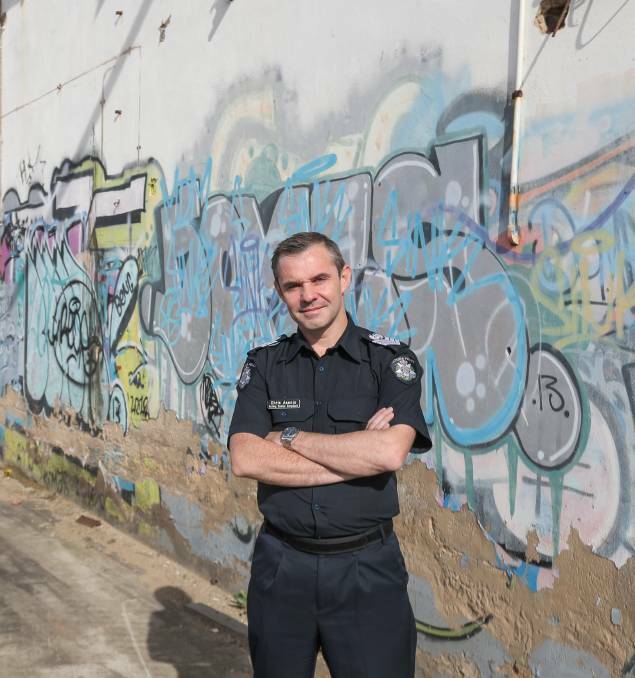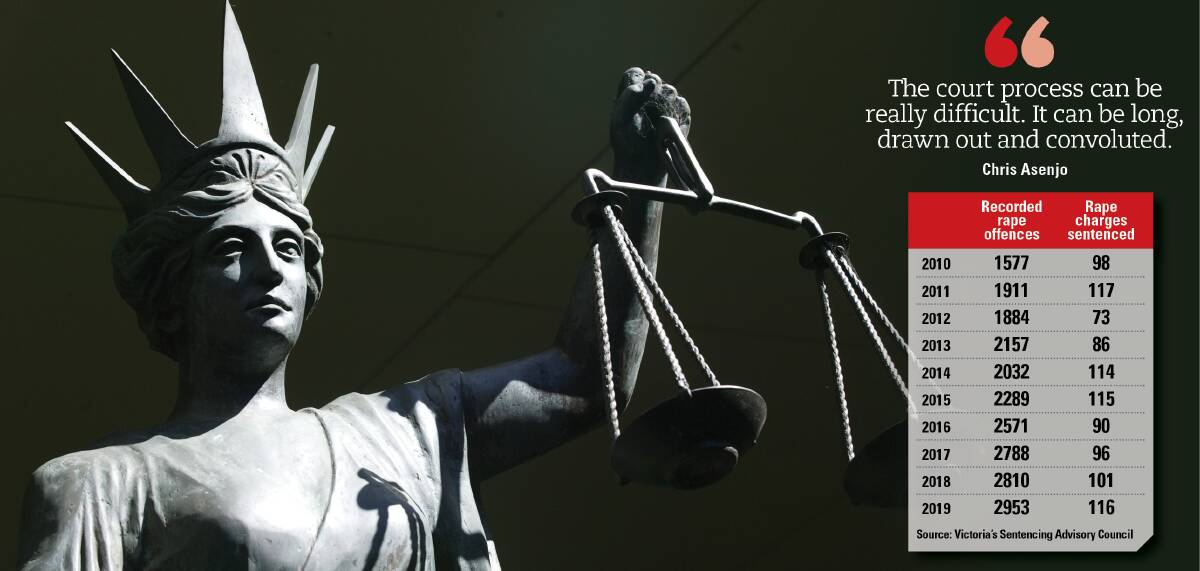
Recorded rapes and sexual assaults both doubled in a decade but there was no increase in the number of offenders sentenced, a new report has revealed.
Subscribe now for unlimited access.
$0/
(min cost $0)
or signup to continue reading
Victoria's Sentencing Advisory Council has found the number of recorded rapes in Victoria increased from 1577 to 2935 in the 10 years to 2019 while the number of offenders sentenced jumped from just 98 to 116.
Sexual assault offences jumped from 1310 to 3049 in the same time period while the number of sentences increased from about 200 to 300. The majority of those sentences occurred in a magistrates' court.
Incest offences recorded by police barely changed from about 500 each year and the number of those sentenced also remained about the same with about 110 each year.
The south-west's leading sex assault police investigator Detective Senior Sergeant Chris Asenjo said the increase in reports was a positive step but the evident disparity in a corresponding increase in sentences showed "there's still a long way to go".
"We know that sexual assaults previously went unreported because victim-survivors didn't have confidence to speak to police about these matters," he said.
"That might be because they feared they might not be believed, the processes were difficult or due to a lack of confidence in police's ability to investigate, but since the inception of stand-alone sex offence units, we're finding our one-stop shop for the reporting, investigating and prosecution of sexual assault matters has been a really promising step."
Detective Senior Sergeant Asenjo, who oversees the Warrnambool-based sex offences and child abuse investigation team, said it was not uncommon for victims to drop away during the criminal court process.
"The court process can be really difficult," he said.
"It can be long, drawn out and convoluted. It can take several years for a matter to fully go through the court system, particularly in those high level courts, and that is a difficult process for victim-survivors to go through."
If a sexual assault report proceeds to court and the accused perpetrator pleads not guilty, the victim-survivor is often called to court to be cross-examined in front of a magistrate or jury.
During the cross-examination process, a victim-survivor is questioned about the evidence they have already given, which Detective Senior Sergeant Asenjo said could be traumatic.
"It's also difficult in a contested matter to find a person guilty of any crime," he said.
"The burden of proof to find someone guilty in a contested matter has to be very, very high. That in itself is another difficult process for victim-survivors to go through."
The detective said a recent finding of guilt in the Warrnambool County Court was six years in the making.
The police investigation was long and the criminal process drawn out due to adjournments and multiple trials.
But a jury last month found the women guilty of more than 10 offences, including incest with her two daughters.
"That's been going on for six years and you can only imagine being the victim-survivors who have had that on their plate for the entirety of that time," Detective Senior Sergeant Asenjo said.
"It must be very, very taxing."
But the detective said society had come a long way in the last decade - specialised sexual offences and child abuse investigation teams worked closely with victims and advocated for them to have their day in court.
"We're definitely seeing increases in the amount of matters actually going to court as opposed to not being authorised in the past," he said.
"Police and prosecuting agencies are taking more of a chance with matters in line with community expectations. We are advocating for victims and doing our best to get the matter to court whereas previously if the decision was made that there wasn't enough evidence, then it wouldn't be proceeded with."

Detective Senior Sergeant Asenjo said while some matters didn't result in successful prosecutions, police continued to test legal boundaries in the "hope that juries and the courts have a new, progressive and innovative look at the prosecution of all victim-based crimes".
"While it's disappointing that the rate of increased convictions or matters going to court isn't in line with the number of reports, it's a good step forward that victim-survivors are finding the confidence to come to police," he said.
"We're here to provide support, alongside the relevant services like Emma House and Centre Against Sexual Assault which police have really integrated positive relationships with."
Detective Senior Sergeant Asenjo said police would never slow down when investigating "very serious crimes".
"We want to prosecute offenders and we want to see offenders be punished for the crimes they have committed," he said.
"In this part of the world the vast majority of sex offenders are committed in the family home or by someone related or known quite well to the victim and probably 10 or 15 years ago they weren't even being reported but now they are and that is a testament to every victim-survivor out there who has managed to come to the police station and tell us that some very terrible things have happened to them."
Over the 10 years, 14,886 contact sex offences were sentenced in 5527 cases in Victoria. Of those offenders, 97 per cent were male.
Many sentenced offences were the historical offence of indecent assault which was in effect prior to 1991.
Contact sex offences include rape, sexual assault, incest, child sexual penetration and assault, and persistent sexual abuse of a child.
The average term of imprisonment for a case involving rape offences was seven years and two months and for sexual assault it was two years and three months.
The maximum penalties are 25 years and 10 years, respectively.
Key findings of the report show there was a 25 per cent increase in the number of reports about sexual offending against children, while the number of sexual offences committed against adults also more than doubled.
"Despite this significant increase in recorded sex offences, the number of sentenced sex offences actually decreased slightly," the report said.
IN OTHER NEWS:
A breakdown of the data shows one in 23 rape offences reported to police resulted in a charge being sentenced by the courts.
One in six sexual assault offences reported to police resulted in a charge being sentenced, dropping to one in five for child sexual assault offences.
The report, commissioned after changes to make prison mandatory for certain offences, also revealed a noticeable increase in the length of prison sentences for sex offences.
Sentencing Advisory Council chairman Arie Freiberg said sex offences, particularly against children, were receiving more severe sentences now compared with a decade ago.
The average sentence for incest with a child increased from four years to seven years over that period.
"This is due to a variety of factors - legislative reforms, a number of cases by the Court of Appeal calling for an increase in sentencing practices for certain offences, and an improved understanding of the lasting harms of sexual abuse," Professor Freiberg said.
If you have personal concerns about sexual assault, you can contact the National Sexual Assault, Domestic Family Violence Counselling Service, available 24 hours a day, seven days a week, on 1800RESPECT (1800 737 732) or on web chat at 1800respect.org.au.
In an emergency, call 000.
For mental health support, contact Lifeline on 13 11 14.
Our journalists work hard to provide local, up-to-date news to the community. This is how you can access our trusted content:
- Bookmark https://www.standard.net.au/
- Make sure you are signed up for our breaking and regular headlines and newsletters.
- Follow us on Facebook, Twitter, Instagram and LinkedIn.
- Tap here to open our Google News page.
- Join our Courts and Crime Facebook group and our dedicated Sport Facebook group
- Subscribe


